Happy Campers
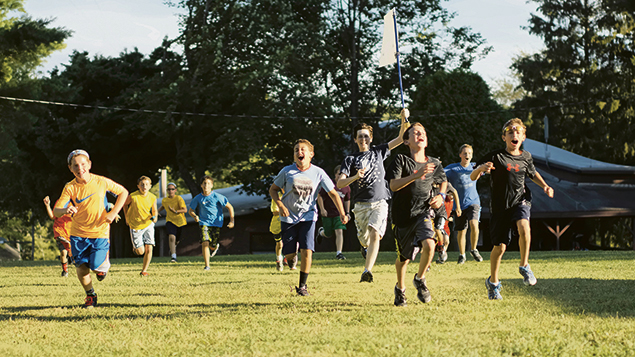
Camp matters. Jewish camp matters.
It sounds like an obvious idea, elegant in its simplicity, but like most elegant, simple ideas, it took a very long time for anyone to realize it.
In the beginning, a century or so ago, Jewish camping had been something that generations of Jewish parents had used to provide their children, most of whom were growing up in cities, with an escape to the country, to become Americanized, to have a chance to breathe, and to give their beleaguered parents a chance to breathe too. It was more or less a fresh air camp for Jews; the point was not to stress their Jewishness but to teach them how to escape it, or at least to cordon it off.
Over time, that changed.
A history of Jewish camps in North America can trace the way those camps adapted to the Depression, the post-World War II world, and the vast societal changes that followed, faster and faster and terrifyingly faster. But there’s one part of that change we’d like to focus on now. It’s the change that we can trace to the efforts of one couple, Elisa Spungen Bildner and Robert Bildner of Montclair.
The Bildners were honored last month not by a Jewish organization — certainly the couple has been showered with recognition by Jewish groups— but by a more general camp-world body, the American Camp Association. They were given the Hedley S. Dimock award for “their extraordinary leadership, generous philanthropy, and significant impact on the field.”
“We’re happy to have received the award, but what is remarkable to us is that a non-Jewish organization took an interest in Jewish camp and seemed to understand the power of camp as a way to transmit values — in this case, Jewish values,” Ms. Bildner said.
“We understand that faith-based camping has not been growing — but Jewish camping in contrast, has been,” Mr. Bildner said. “A wonderful aspect of this award is that it is a recognition that we are doing something important.
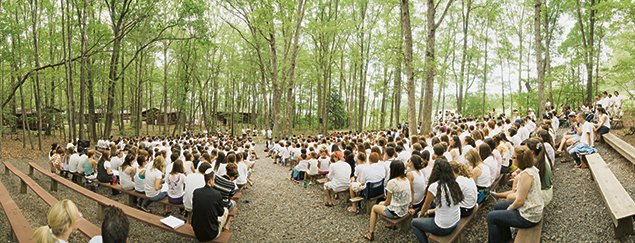
(A note: The camping world classifies Jewish camping as belonging to the faith-based part of the movement, although faith is just one of the criteria involved in Jewish camping, and its importance in relation to culture and other kinds of Jewish identity varies from camp to camp.)
“There are so many kinds of camps in this country — Boy Scout camps, all sorts of secular camps — that emphasize so many different kinds of skills, sports, and interests, and Jewish camp is a subset of that,” he continued. “A camp that promotes a cultural and religious identity as we do is singular. It is different.
“When campers are playing baseball or tennis or in arts and crafts, it is all infused with Jewish values and ethics.”
On the other hand, he said, “Jewish camp also is camp, and we strive to improve the camps as camps per se.”
Both Bildners are gratified by the award because “it’s recognized the leadership of the Foundation for Jewish Camp, which over the last 25 years has brought together families, professionals, funders, and the Jewish community in general to recognize how important camp is to our Jewish future,” Mr. Bildner said.
“Jewish camp is one of the institutions that obviously is working,” he added. “And it’s had an extraordinary result, bringing together hundreds of thousands of campers and families, and raised many millions of dollars for professional training and for the camps themselves.”
So that’s where Jewish camping is now. How did it get there? And what do the Bildners have to do with it?
Elisa and Rob Bildner grew up in different parts of the Jewish world. “I’m a product of Ramah Wisconsin,” Ms. Bildner said. “From that camp, I have an appreciation for camp, a real fondness for it.” Mr. Bildner, who is from West Orange, is the son of Joan and Allen Bildner, the CEO of Kings Supermarkets; his parents also founded Rutgers University’s Allen and Joan Bildner Center for the Study of Jewish Life and were major and active philanthropists whose generosity funded many local programs and institutions. He went to a camp that “was filled with Jewish campers and counselors, but it was not Jewish.”
They both loved camp. She was able to get an appreciation of Jewish life from the experience; he was not, but he had a lot of fun there and appreciated its seductive charms. Both felt camp’s immersive atmosphere, where friendships matter immensely, and the outside world doesn’t particularly loom.
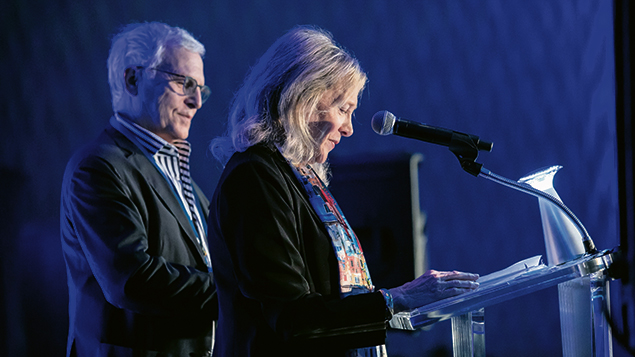
When they married and had children, the Bildners sent them to Camp Ramah in the Berkshires.
In 1990 or so, both Bildners were Wexner Fellows, selected to be part of a group of Jewish lay leaders, people with clear leadership potential, who were trained and challenged as leaders. “We came away from that program imbued with the idea that we were all charged with doing something specific to improve Jewish life,” Ms. Bildner said.
“Rabbi Herb Friedman, of blessed memory, who set forth that charge, talked about how often institutions are created in the Jewish community, but they don’t necessarily excel. Our challenge was to look at the institutions and decide who we want to work with to help.
“We’d both had very good experiences at camp, so when we drove away from that conference, we looked at each other and talked about how camp is a tremendous way to inculcate a love for Jewish life,” she said. “We were disappointed with the quality of some of the aspects of Jewish camps.”
“Jewish camping hadn’t been in the spotlight for a long time,” Ms. Bildner continued. “There are many portals into Jewish life, but we felt that not that many people recognized how important camp could be. That’s not to say that there wasn’t great work going on in camps, but there wasn’t a lot of funding for them, and there wasn’t a lot of interaction between them, except within the denominations.” If one camp came up with a good idea, that idea was not shared.
They talked to their friend Skip Vichness, who later became the chair of the Foundation for Jewish Camp. Like the Bildners, he lived in Essex County and was very active in local and national Jewish life and philanthropy. “He was the well-known owner of private secular camps,” Ms. Bildner said. “When he became chair, he said that when Jewish families decide to send their kids to Jewish camps rather than to his camps, he’d know that the foundation had achieved what it wanted — for the camps to excel.”
“We found that many of the camps were not excelling,” Mr. Bildner said. He was surprised by the lack of communication between them. “When we convened the field, we assumed that everyone would know each other,” he said. “But they didn’t.”
Jewish camp “wasn’t seen as an entrée into Jewish life, so little philanthropic money was going into them, except from selective donors,” Ms. Bildner said.

“Early on, we had several potential donors come to some of the Ramah camps,” she continued. “They were interested in camp as a route to Jewish education. They came into the camp, saw some people doing Israeli dancing, heard a discussion of some political issues involving Israel, saw some signs in Hebrew. It was lunch time. We said, ‘Let’s have lunch in the chadar ochel.’” The dining room. “They said, ‘No. We’re leaving. We don’t see any education here. We just see Jewish kids having fun in the woods. This is not education.’”
So they had to confront the idea that fun and learning are mutually exclusive.
“Our mission was to motivate people to see Jewish camp as a transformative experience,” Mr. Bildner said. “To get federations and philanthropists to establish the foundation and professional teams.”
In 1998, they established the foundation, after figuring out ways to appeal to donors and make clear that fun and transformational experiences can happen at the same time, in the same place, because often they’re the same thing.
“We’d like to shout out to Edgar Bronfman, because he was one of the first founders to say that he was in,” Mr. Bildner said. “In terms of getting attention in the Jewish community, it is important to attract some of the key large donors. And we also want to shout out to the Jewish Funders Network — I’m a past chair, but also because of who we met through that group. And although it took a lot of work at first to convince the Avi Chai Foundation, they embraced Jewish camp and commissioned academic studies to document the impact.”
After many meetings with many donors, visionary and otherwise, the foundation was established, and Jewish camping began to take off.
The foundation now supports more than 300 camps across North America. From the beginning, it “encompassed camps at all ends of the Jewish world,” Ms. Bildner said. “When we first started, we gave relatively small grants. We looked at each camp and saw what it needed.
“We are an enormous tent. We range from the very far left to the very far right, from Chabad to the Workers Circle, with camps from every denomination. When you go to one of our leadership meetings, you see the most Orthodox to the most secular.
“Many years ago, we were at a secular Jewish camp. It was entirely nonreligious. We saw that the bunks were named for Jewish heroes. They lit candles on Friday night — but they didn’t call them Shabbat candles. Their activities were not at all religious, but they were very cognizant of Jewish history and culture, as was reflected in the bunk names.
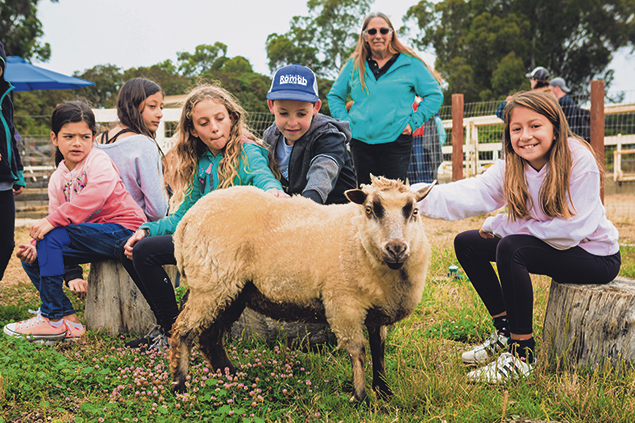
“As we were leaving the camp, a woman came running after us with a huge black portfolio, and she gave it to us. She said, ‘I’m sure you won’t give us money, but this is my master’s thesis about the power of Jewish camp. I will tell you that given my family, there is no way that I would have considered myself Jewish but for Jewish camp.
“The camp got the grant.”
The Bildners are particularly proud of the FJC’s One Happy Camper program, which gives a scholarship to a child going to Jewish camp for the first time. There are no means tests for that scholarship.
Paying for camp always can be a challenge for families who want to send their children but can’t afford it; the foundation works on creative ways to help. “We take on the challenge to find the funds for every Jewish family who otherwise could not afford camp,” Mr. Bildner said.
The foundation also has established a leadership program for camp directors, assistant directors, and counselors. Its range of programs, listed on its website, jewishcamp.org, is astoundingly wide-ranging.
“We have to make the field aware that we have to support the umbrella movement” — the Foundation for Jewish Camp — “as well as local camps,” Ms. Bildner said. “They are not in conflict with each other.
Even before the pandemic, children and teenagers were dealing with increased levels of mental health challenges, most likely caused at least in part by the new pressures posed by social media. Camps were affected by those challenges. They were severely affected by the pandemic, which forced kids inside, spending time alone staring at their images on their screens and considering how they couldn’t live up to their assumptions about how much better everyone else was than they were.
Camps also were affected financially by the pandemic; even nonprofits need income, and no campers means no money coming in. “The foundation has raised money to provide mental health professionals and find therapists,” Mr. Bildner said. “But for the Foundation for Jewish Camp, there would not be any Jewish camps after the pandemic,” Ms. Bildner said. “Without help, many camps would have folded.”
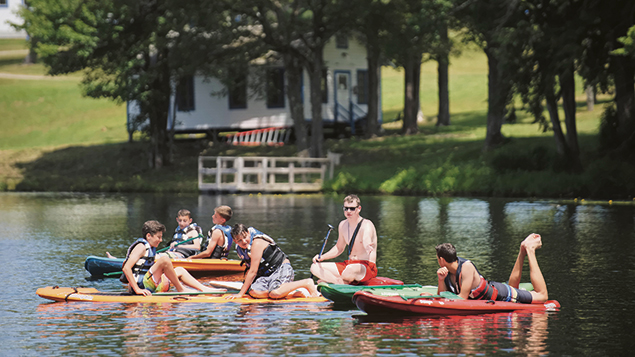
“When we started the foundation, there was no central address, no leadership, no spokesperson for the camps,” Mr. Bildner summed up. “That is what the foundation has become.
“During the pandemic, we focused on the foundation to keep Jewish camping alive. Now we have to look at the issues, from security to education to the challenging conversations about Israel that every institution in the Jewish world is having.”
“Jewish camp is a moving target, just as Jewish life in general is now,” Ms. Bildner said. “Of course Israel is on the list, along with mental health. And we know that the secular world offers a lot of things that Jewish kids want to do over the summer, so we have to do extraordinary things to attract them.
“That’s specialty camps,” Mr. Bildner said. “In 25 years the foundation has done some amazing programs.”
Camps have to be marketed, the couple said. “How do we compete with the market?” Ms. Bildner asked. “We can’t be off in our corner. We have to be cognizant of what the market offers, and be equal if not better than it.”
It helps that they come from the business world, and that Ms. Bildner is a lawyer. “We are very conscious of how we engage with customers to get them to change their behavior,” Mr. Bildner said. “We have always looked at camp through that lens. It is a market. We have to identify what young people are looking for.
“Jeremy” — that’s Jeremy Fingerman, the foundation’s CEO — “was the CEO of Campbell Soup,” he continued. “When we look at potential board members, we look at it as we’d look at a board in a for-profit company. What can someone bring that would move the needle?”
Jeremy Fingerman, the foundation’s CEO, lives in Fort Lee. He went to the foundation after a successful career as a business leader, culminating in his leadership of Campbell Soup and then of Manischewitz. He’s also a former Jewish camper, the father of Jewish campers, and deeply involved in Jewish life. His job at the FJC is the logical endpoint for his training, knowledge, convictions, and passions.
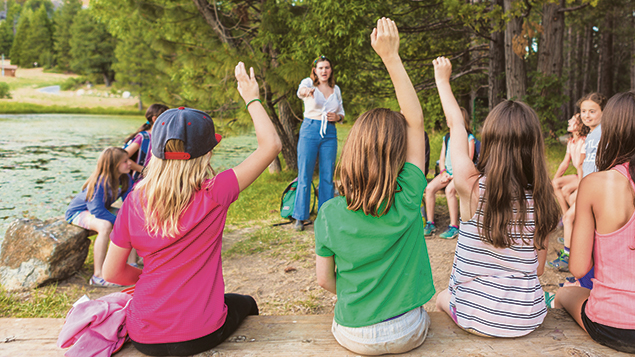
He is deeply impressed by the Bildners’ work for Jewish camp. “The JFC basically became their fifth child, which they nurtured and nourished,” he said. “In the early days, they carried FJC, and then they got Edgar Bronfman and the Avi Chai, and then the momentum started.
“Most founders completely step away from the organizations that they start,” he continued. “Elisa and Rob have continued their generous philanthropic investment for 25 years now. That doesn’t happen often. And they continued to make connections and to advocate for the field.
“The Bildners stayed with the foundation not as chairs, but because it is their child. I remember that when we celebrated FJC’s 18th anniversary, I said, ‘Your child is getting to be an adult,’ and we laughed. In the early days, their child needed more attention from them. As it went into its teens, it became more self-sufficient, and now at 25 it is self-sufficient, but it still has a connection to its parents. And the parents are proud of it.
“Their presence enriches the work of the foundation. It gives it history. The Bildners got recognition for the field, and the people who have worked in the field for many years know that there was no field before they unified and galvanized it.”
It also professionalized the field.
All those reasons “are why the American Camp Association chose to recognize them,” Mr. Fingerman said. They also recognize that 300 nonprofit Jewish camps working together have helped the broader field of camping to grow.
“The association told me recently that other faith-based camp movements have started to falter. They don’t have the kind of unity and organizational power that Jewish camps have, and that can help a field overcome covid.
“Camp on its own is an incredibly powerful experience in developing an individual,” he said. “It helps them learn independence, problem-solving, and teamwork. There’s nothing to top it. And that’s just the benefits of any camp. Add to it the benefits of a joyous Jewish community….
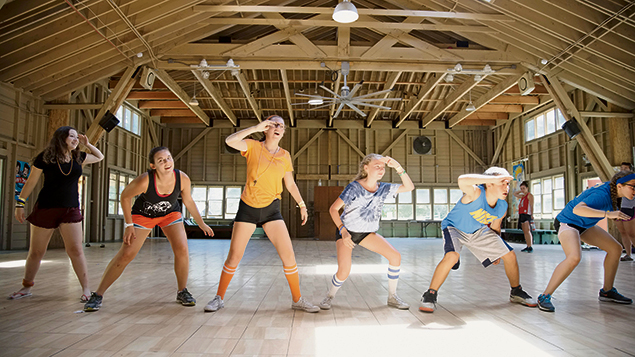
“That’s what the Bildners recognized back then — that Jewish camp has a power that other parts of the Jewish community didn’t necessarily recognize.”
Mr. Fingerman tells two stories, but it’s really one story, about connections.
“In early 2010, before I joined, a recruiter called me. Because the Bildner family owned Kings, and I was at Campbell Soups and then Manischewitz — I made the first certified kosher soup at Campbell, vegetarian vegetable soup — they had connections, and they called around.” They were in overlapping businesses.
And then of course there were the Jewish world connections. “They introduced me to Lisa Eisen, who is now the co-president of the Charles and Lynne Schusterman Foundation. They didn’t realize that we were in USY together. She was from Louisville and I was from Cincinnati; we were both in USY’s central region, CRUSY. And Eric Fingerhut, who was regional president of CRUSY before me, was president of Hillel and now of the Jewish Federations of North America,” and so they have overlapping interests and work together. (Mr. Fingerman also was international president of USY, a highly prestigious position for high-school seniors.) “It’s one of the wonderful things about working on a national scale. You run into people and reconnect with them.
“In camp, you build up a lifetime of friendships.” One of his closest friends came from Ramah Wisconsin. “Oh my God, it’s 50 years ago,” Mr. Fingerman said. “Rabbi Lee Buckman. He lives in Israel, and he’s still a very close friend.”
There’s a lesson in those names. “You make connections at camp, and those connections are sticky. They’re glue.” They’re with you for life.
“Kids need that more than ever,” he continued. “Before October 7, I said that we need it because kids have to get off screens.
“Now, the summer enrollment and staffing trends are very strong. It’s going very well. We think that it’s because camp is seen as a safe space, especially for college students,” who staff the camp and whose education is as important to camp leaders as the younger kids’ is. “College kids can leave the tension and drama on campus and come to a safe space. Yes, there will be discussions about the situation, but they are going to their second home in order to reconnect and recharge.
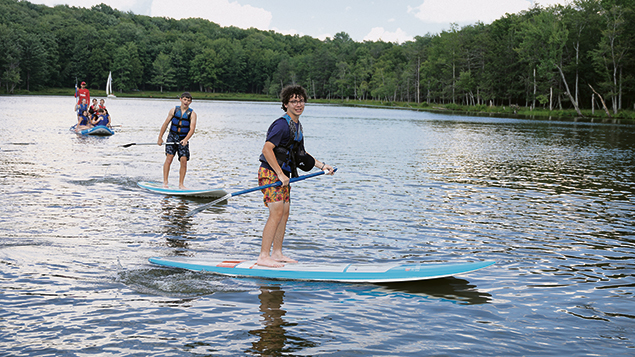
“Enrollment in Jewish camp has reached within a percentage point of prepandemic levels,” Mr. Fingerman said. “We think that this summer will be even stronger.”
One result of October 7 is likely to be a reduction in the number of shlichim, the Israeli counselors who make up a significant part of many Jewish camps’ staffs.
“We are working on contingency plans if some of them are still in the army,” he said. “How do we help camps overcome that?
“I think we usually get more than 1,500 shlichim from the Jewish Agency alone, and they connect the camp community to Israel.” He has more connection stories — when he was in Israel in December, his group went to help staff a barbecue for IDF soldiers near the Gaza border. “I met an officer, a reservist in the tank corps, who had been a shaliach in Camp Kinder Ring for eight years. He said he has four kids now, and he’s taken them to camp.
“And last Sunday, I was at a big dinner honoring the CEO of the federation there, Jacob Solomon, and I was sitting next to a woman who worked for the Jewish Agency. I told her that story — and it turned out that she knew him, because she had gone to that camp.” Everyone is connected, and everyone is connected to Israel, all through camp.
Toward the end of February, the FJC sent a group of nearly 50 professionals to Israel, in partnership with the Jewish Education Project. It’s also convening a summit on mental health issues at the Marlene Meyerson JCC in Manhattan this week. “Mental health issues have only become more pronounced because many camp communities have lost shlichim” in Gaza, Mr. Fingerman said. “Some were taken hostage; some have been released, some have been killed. The trauma has hit everyone.
“We have provided grants to 102 camps. That’s about a third of our network. We have given grants for at least three years of funding for an incremental health professional. That means that if you are a camp that has three mental health professionals, our grant allows you to have a fourth.”
All in all, looking at all the challenges that these last few terrible years have thrown at all of us, at the challenges inherent to growing up in this, our world, and to the extra challenges newly posed by growing up Jewish, we see that camp provides a refuge. A place where kids can grow, learn, laugh, and have actual, for-real fun.
Or, as Mr. Fingerman puts it, “Jewish camp works. It’s the connector. It’s the glue. It develops a strong Jewish identity. It develops leaders. It gives campers the independence, the skills, and the competency that are generic to all camps, and then you get the Jewish part on top.” It’s the icing on a particularly wonderful cake.



